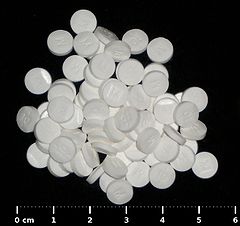DESCRIPTION

Methylphenidate 10 mg tablets
Methylphenidate (MPH; marketed as Ritalin, Concerta, Metadate or Methylin) is a psychostimulant drug.
CLASSIFICATION
The chemical name of methylphenidate is dl-threo-methyl-2-phenyl-2- (2-piperidyl) acetate; it is a CNS stimulant. The structural formula is as follows:


PHARMACOKINETICS
Methylphenidate belongs to the piperidine class of compounds and increases the levels of dopamine and norepinephrine in the brain through reuptake inhibition of the monoamine transporters. Dopamine helps people control their behavior. So having the right level of dopamine in the brain is important. MPH possesses structural similarities to amphetamine, and, though it is less potent, its pharmacological effects are even more closely related to those of cocaine yet without those addictive effects.
INDICATIONS
MPH is the most commonly prescribed psychostimulant and works by increasing the activity of the central nervous system. It produces such effects as increasing or maintaining alertness, combating fatigue, and improving attention. The benefits and cost effectiveness of methylphenidate long term are unknown due to a lack of research. The long term effects of methylphenidate on the developing brain are unknown. Methylphenidate is not approved for children under six years of age.
It is prescribed to the treatment of:
• Attention deficit hyperactivity disorder (ADHD)
• Narcolepsy
• Adjunctive
• Substance dependence
• Pervasive developmental disorders ( Autism )
• Investigational
MOLECULAR MECHANISM
Methylphenidate exerts its therapeutic effects increasing dopamine levels in the synapse. The onset of central nervous system effects occurs rapidly after intake of methylphenidate and persist for about 4 hours. The mechanism of action and chemical structure of methylphenidate is extremely similar to cocaine with usual doses of both drugs occupying 50% of dopamine transporters. However, cocaine effects such as euphoria are rare at doses prescribed clinically.

Methylphenidate is a norepinephrine and dopamine reuptake inhibitor, increasing the level of the dopamine neurotransmitter in the brain by partially blocking the dopamine transporter (DAT) that removes dopamine and norepinephrine from the presynaptic neuron. It also stimulates the release of those neurotransmitters into the synapse.
One study finds that methylphenidate reduces the increases in brain glucose metabolism during performance of a cognitive task by about 50%. This suggests that, similar to increasing dopamine and norepinephrine in the striatum and prefrontal cortex, methylphenidate may focus activation of certain regions and make the brain more efficient. This is consistent with the observation that stimulant drugs can enhance attention and performance in some individuals. If brain resources are not optimally distributed (for example, in individuals with ADHD or sleep deprivation), improved performance could be achieved by reducing task-induced regional activation.

SIDE EFFECTS
Methylphenidate may cause side effects.
• nervousness
• difficulty falling asleep or staying asleep
• dizziness
• nausea
• vomiting
• loss of appetite
• stomach pain
• diarrhea
• heartburn
• dry mouth
• headache
• muscle tightness
• uncontrollable movement of a part of the body
• restlessness
• numbness, burning, or tingling in the hands or feet
• decreased sexual desire
• painful menstruation
Methylphenidate may cause sudden death in children and teenagers, especially children or teenagers with heart defects or serious heart problems. This medication also may cause sudden death, heart attack or stroke in adults, especially adults with heart defects or serious heart problems.
Methylphenidate may slow children's growth or weight gain.
DOSAGE
Dosage should be individualized according to the needs and responses of the patient.
OVERDOSE
Symptoms:
Signs and symptoms of acute overdosage, resulting principally from CNS overstimulation and from excessive sympathomimetic effects, may include the following: vomiting, agitation, tremors, hyperreflexia, muscle twitching, convulsions (may be followed by coma), euphoria, confusion, hallucinations, delirium, sweating, flushing, headache, hyperpyrexia, tachycardia, palpitations, cardiac arrhythmias, hypertension, mydriasis and dryness of mucous membranes.
Treatment:
Appropriate supportive measures. The patient must be protected against self-injury and against external stimuli that would aggravate overstimulation already present. If signs and symptoms are not too severe and the patient is conscious, gastric contents may be evacuated by induction of emesis or gastric lavage. In the presence of severe intoxication, use a carefully titrated dosage of short-acting barbiturate before performing gastric lavage.
Intensive care must be provided to maintain adequate circulation and respiratory exchange; external cooling procedures may be required for hyperpyrexia.
Efficacy of peritoneal dialysis or extracorporeal hemodialysis for methylphenidate overdosage has not been established.
di Andrea Spadafora e Paola Mlekuz